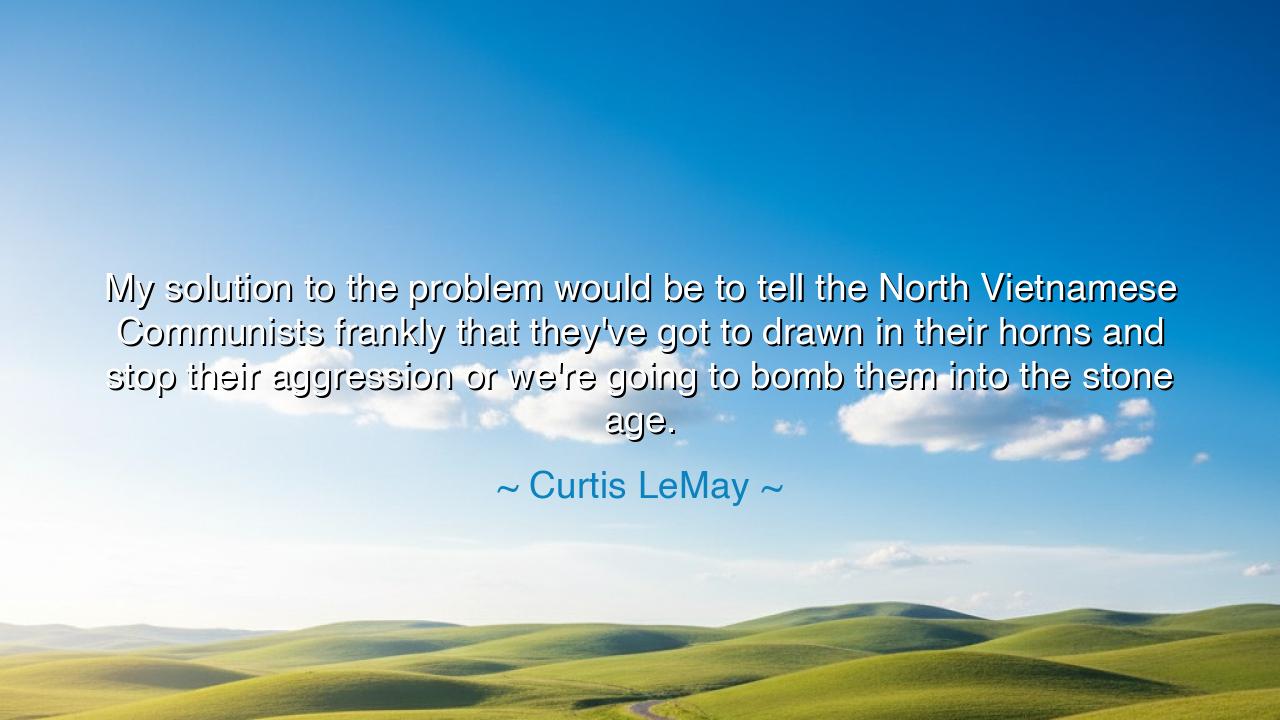
My solution to the problem would be to tell the North Vietnamese
My solution to the problem would be to tell the North Vietnamese Communists frankly that they've got to drawn in their horns and stop their aggression or we're going to bomb them into the stone age.






“My solution to the problem would be to tell the North Vietnamese Communists frankly that they've got to draw in their horns and stop their aggression or we're going to bomb them into the Stone Age.” — Curtis LeMay
Thus spoke General Curtis LeMay, a man forged in the furnace of the twentieth century’s greatest wars, a soldier whose words burned as fiercely as the engines of the bombers he commanded. In this bold declaration, he embodies the raw and terrible logic of total war — a creed born not from cruelty, but from the ruthless arithmetic of power. He believed that peace was to be secured not through patience or diplomacy, but through overwhelming strength, through the unflinching readiness to destroy so completely that the enemy’s will to resist would crumble before the first blow. To modern ears, his words sound harsh, even merciless. Yet to understand them is to glimpse the spirit of an age when the shadow of annihilation hung heavy upon the world.
Curtis LeMay was no mere theorist of destruction. During the Second World War, he was the architect of the devastating bombing campaigns over Germany and Japan — a man who believed that decisive action, however brutal, could shorten wars and save lives in the long run. His philosophy was that of the ancient generals, for whom hesitation was the mother of defeat. When he spoke of bombing the enemy “into the Stone Age,” he did not mean savagery for its own sake, but the application of total force to break the cycle of conflict swiftly and irrevocably. His was the mind of Mars, the god of war — clear, disciplined, but merciless in its pursuit of victory.
Yet within his words lies a tension as old as civilization itself — the eternal conflict between power and morality, between the might of nations and the conscience of humanity. The ancients, too, wrestled with this dilemma. When the city of Carthage defied Rome for the third and final time, the Roman Senate resolved to end the threat once and for all. Carthage was razed to the ground, its soil salted, its people scattered — an act meant to secure peace through terror. The Romans called it pax romana, the peace of Rome, yet it was peace born from ashes. So too did LeMay believe that destruction could lead to safety, that to end aggression one must strike not at the body, but at the spirit of the enemy.
But history teaches us that such power, though mighty, carries a terrible cost. For in seeking to end war through domination, man risks becoming what he fears most — the destroyer rather than the protector. In LeMay’s time, the skies trembled with the threat of nuclear fire. The Cold War was not only a struggle of nations, but of philosophies — one side preaching freedom, the other revolution, and both bound by the terror of mutual destruction. LeMay’s words captured the fury of that moment: a warning cloaked in iron. To him, mercy without strength was folly; yet strength without wisdom was ruin.
Consider also the words of Sun Tzu, the ancient Chinese master of strategy, who wrote that “to subdue the enemy without fighting is the acme of skill.” Where LeMay saw salvation in force, Sun Tzu saw it in foresight — in the quiet mastery that wins before the sword is drawn. Yet both understood one truth: that hesitation in the face of aggression invites greater suffering. LeMay’s “Stone Age” threat was born not of cowardice, but of fear — fear that indecision and appeasement would lead to endless war, just as they had in the years before the Second World War. In this, he echoed the tragic wisdom of his era: that strength deters, but weakness invites chaos.
And yet, there is another layer to his words — a warning not only to his enemies, but to ourselves. For to wield destruction as a path to peace is to walk upon the edge of a sword. Humanity, standing at the dawn of the nuclear age, had been given the fire of the gods — and like Prometheus, we were left to decide whether to use it for light or for ruin. LeMay’s fierce declaration reminds us that power alone cannot preserve civilization; only wisdom, guided by compassion, can temper it. Without such restraint, the conqueror and the conquered share the same fate: the ashes of their own making.
Practical counsel for the seeker:
-
Strength is necessary, but it must always serve justice, not pride.
-
Never mistake destruction for dominance; true victory preserves what is worth saving.
-
Be firm against evil, but not blind to humanity; even the enemy is still a soul.
-
Remember: peace earned by terror is peace that cannot endure. Only peace built upon understanding and balance will outlast the ages.
For as Curtis LeMay teaches, the power to destroy is easy to find — but the wisdom to wield it rightly is the rarest of all virtues. His words are both a reflection of his time and a mirror for our own: a reminder that civilization stands always at the threshold between courage and catastrophe. To conquer the enemy is one thing; to conquer the darker impulse within ourselves — that is the truer victory, and the only one worthy of the name peace.






AAdministratorAdministrator
Welcome, honored guests. Please leave a comment, we will respond soon